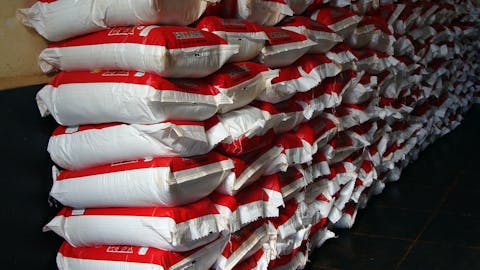And so I look at these things as opportunities, how in the weeds are you in that business and real estate professionals are resilient, just like mortgage brokers are resilient. And so I’m not really concerned about them – that impact in the business. Broker and real estate agents are tied at the hip. They will help each other grow, help each other succeed. And hey, maybe what I have to do is they’ll do more business and they do more business, that helps them and helps loan officers and helps UWM and helps consumers. And so we will see how it all shakes out. I think it’s too early to really get a read on what will happen. But I do think that usually people that are very involved in the business, very in the weeds of the business like UWM is and like brokers are and real estate agents usually capitalize on change more than get hurt by change.
Doug Harter: Appreciate those insights. Thanks Mat.
Mat Ishbia: Thank you.
Operator: Your next question comes from the line of James Faucette with Morgan Stanley. Please go ahead.
Jeff Adelson: Yes. Hi. Good morning. This is actually Jeff Adelson on for James Faucette. Good morning. Just wanted to circle back on some of the pricing initiatives you guys have talked about. I know about a month ago, you launched this Refi 100 initiative. Just curious what the uptake on that has been like with your brokers and volumes? Like how meaningful that’s been to your volume so far this quarter, and just maybe your appetite for additional pricing initiatives going forward?
Mat Ishbia: Yes. So, first off, talking about pricing initiatives and different things we have done through the years, and I think it’s good because I think a lot of you guys have been following us for years and seeing from – we said Game On, what was that 15 months ago, and what we would do with that as a pricing initiative and how is that working? And obviously, if you look at the fourth quarter of 2022 versus the fourth quarter of ‘23, we had Game On in the fourth quarter of ‘22, which means half the margins. And we did – and it was a lower interest rate environment. In this year in the fourth quarter ‘23, we have much bigger margins, higher interest rate environment, and we still do more business. So, I think it talks to some of these initiatives that create stickiness.
What we know is this for facts. UWM is the best mortgage company in America. We were without question the best wholesale lender of the country. The game for us is we want to get loan officer to leave the retail channel and join the broker channel, which they are happening all the time. I talk to them all the time. It’s happening right now. And on top of that, we want brokers that are in the broker channel to try UWM. When they use UWM, they become sticky because UWM is the best. We help them grow their business. We help train them. We help them partner with real estate agents. We help them market like we do all this stuff. And so it’s all about getting them in. So, pricing incentives and different initiatives are always focused on long-term.
I am never focused on the short-term impact. I will focus on what does that mean long-term. And I think if you go back and read what I said maybe in June or July, whatever it was in 2022 about what success looks like on Game On, it’s going to be broker channel growth, loan officers converting, which has happened. And then does UWM gain market share and also retain the market share when we go back to normalized margins. And I think the data shows that we have done that and then some. And so I look at these things is all positive, help brokers differentiate, and help brokers grow. Our whole game is helping the brokers win. Help more consumers because by the way, brokers are better for consumers. They say to consumer, you go to mortgagematchup.com, and it saves consumers thousands and thousands and thousands of dollars, like it’s crazy.
And so it’s great that consumers don’t know this. And so we are very excited how do we educate consumers, how do we educate real estate agents, how do we help LOs succeed and all of those things. Sometimes pricing issues on a refi helps. Sometimes pricing these are purchase, sometimes free appraisal. Sometimes we do none of that stuff. But I am always open to those things, anything to help brokers win and succeed. And that’s what we have been doing, and that’s why we are winning, too.
Jeff Adelson: Okay. Great. Thanks for that color. And just on the MSR, I don’t think I have heard anything so far. But it seems like from the disclosures, you didn’t do any MSR sales this quarter, is that right? And why was that? And maybe what’s your appetite looking like going forward there?
Mat Ishbia: Yes, we did one excess trade in the fourth quarter. So – and we have done some trades already this year. Like Andrew said is hedging MSRs like we had a bigger MSR markdown, I think $600-plus million in the fourth quarter, which is obviously just paper moving, it means nothing. And you will see some of that come back this quarter. But once again, don’t give me credit for that, then just like I hope you don’t give me, like it doesn’t matter. But the truth is we have a bigger write-down or write-up than other people because we are actually the only one actually originating loans at these rates. So, we have – if you look at our book, we have more higher rate of our book because we actually did loans in the third quarter and fourth quarter when everyone else didn’t.
And so those loans actually took a bigger write-down, which is why we had a bigger write-off than most people in the fourth quarter. And then coincidentally, you all see that or conversely, you will see that in the first quarter, our write-up of those because rates have gone back up since January 1st. Obviously, we will see what happens in March. I can’t control that stuff. But that’s irrelevant. But we are selling MSRs, and we will continue to sell MSRs and getting good prizes for bringing in cash and continue to build the business when we see an opportunity to do so.




